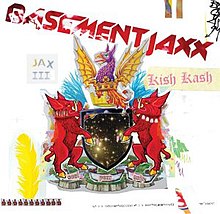Kish Kash
| Kish Kash | ||||
|---|---|---|---|---|
 |
||||
| Studio album by Basement Jaxx | ||||
| Released | October 20, 2003 | |||
| Recorded | March 2002 – August 2003 | |||
| Studio | Jaxx Studio (Loughborough Junction, London, England} |
|||
| Genre | ||||
| Length | 50:35 | |||
| Label | ||||
| Producer |
|
|||
| Basement Jaxx chronology | ||||
|
||||
| Singles from Kish Kash | ||||
|
||||
| Professional ratings | |
|---|---|
| Aggregate scores | |
| Source | Rating |
| Metacritic | 85/100 |
| Review scores | |
| Source | Rating |
| AllMusic | |
| Blender | |
| Entertainment Weekly | A− |
| The Guardian | |
| NME | 6/10 |
| Pitchfork | 9.1/10 |
| Q | |
| Rolling Stone | |
| Spin | B |
| Uncut | |
Kish Kash is the third studio album by English electronic music duo Basement Jaxx, released in October 20, 2003 by XL and Astralwerks. After a lengthy tour which caused them exhaustion and homesickness, they settled in their new studio and wanted to develop a new fresh approach with less reliant on grooves and samples and more focused on songwriting.
It reached number 17 on the UK Albums Chart. It later won the Grammy Award for Grammy Award for Best Dance/Electronic Album the first time it was awarded in 2005. The album was nominated for the Mercury Prize in 2004. Three singles were released from the album: "Lucky Star", "Good Luck" and "Plug It In".
Returning from their 2001 world tour to promote Rooty with exhaustion and homesickness, Felix and Simon settled into their new Brixton studio. In the meantime they released the low-profile experimental Junction EP and remixed Missy Elliott, DJ Sneak and Justin Timberlake. The remixes were easy – the tricky bit was deciding where to go next.
On 23 September 2002, they released second extended play Junction, which included four new songs and was named after Loughborough Junction, the place of the duo's original parties.
The recording process took place between March 2002 and August 2003. According to Buxton, the duo undertook the recording of Kish Kash in "a sober state of mind." While making the album, they both stayed away from clubs, preferring to ignore the latest fads in dance culture, wanting to develop a fresh approach, less reliant on grooves and samples and more focused on songwriting, often starting with just a voice and guitar. "We kind of went back to school," says Buxton. "We got this new studio and had to learn how to use it." Adds Ratcliffe: "There was a greater sense that we didn’t know what we were doing but it was more enjoyable than before."
...
Wikipedia
